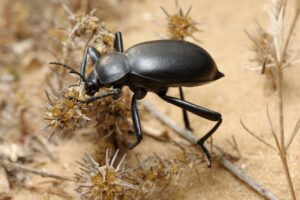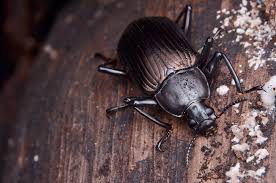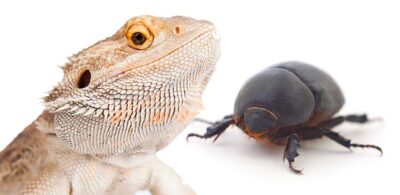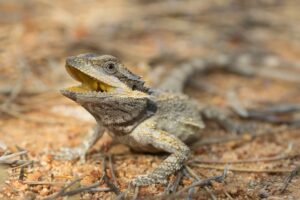Curious about the dietary preferences of your bearded dragon? Wondering if beetles make a suitable addition to their menu? In this exploration, we delve into the intriguing question: Can bearded dragons eat beetles?
Bearded dragons can eat certain types of beetles, but not all. Some beetles are toxic or have hard shells that can be difficult for bearded dragons to digest. It’s crucial to research specific beetle species thoroughly before offering them to your pet.
As a general rule, it’s safest to stick to commercially bred insects like crickets, mealworms, and roaches, which are readily available and known to be safe for bearded dragons. Always ensure that any insects offered as food are appropriately sized and gut-loaded to provide essential nutrients for your bearded dragon’s health.
Types of Beetles

Beetles are a diverse group of insects, with over 350,000 described species worldwide. They belong to the order Coleoptera, which is the largest order in the animal kingdom. Here are some common types of beetles:
- Ladybird Beetles (Ladybugs): These are small, brightly colored beetles with rounded bodies. They are often red or orange with black spots. Ladybirds are beneficial insects as they feed on aphids and other garden pests.
- Ground Beetles: These beetles are typically black or dark brown and have elongated bodies with prominent mandibles. They are often found on the ground and prey on other insects, helping to control pest populations.
- Longhorn Beetles: Named for their long antennae, longhorn beetles have elongated bodies and come in a variety of colors and patterns. Some species are known for their wood-boring larvae, which can cause damage to trees.
- Scarab Beetles: Scarab beetles are often large and oval-shaped with shiny exoskeletons. They are commonly associated with dung beetles, which feed on feces, but not all scarab beetles exhibit this behavior.
- Weevils: Weevils are a type of beetle characterized by their elongated snouts. They are often pests of stored grains and crops, as their larvae feed within seeds and grains.
- Tiger Beetles: These beetles are known for their aggressive hunting behavior. They have large eyes and long legs adapted for chasing down prey on the ground.
- Fireflies: Fireflies are beetles known for their bioluminescent ability, which they use to attract mates. They are often found in damp, wooded areas.
- Rhinoceros Beetles: These beetles are named for the prominent horn-like structures on their heads, resembling the horns of rhinoceroses. They are among the largest beetles in the world.
- Diving Beetles: As the name suggests, diving beetles are adapted for life in water. They have streamlined bodies and often hunt aquatic insects and small fish.
- Bark Beetles: These beetles typically infest and feed on the inner bark of trees, sometimes causing significant damage to forests. They are considered pests in many regions.
These are just a few examples, and there are many more types of beetles with diverse characteristics and behaviors.
Can Bearded Dragons Eat Beetles?
Bearded dragons are omnivorous reptiles and can consume a variety of insects as part of their diet. However, when it comes to feeding them beetles, caution is advised. While some beetles may be safe for bearded dragons to eat, others can be toxic or pose a choking hazard.
It’s crucial to ensure that any beetles fed to a bearded dragon are safe and appropriate for their diet. Some commonly available beetles, such as mealworm beetles or superworm beetles, may be suitable for occasional consumption. However, it’s essential to provide a varied diet and not rely solely on beetles.
Before introducing any new food item to your bearded dragon’s diet, it’s recommended to research thoroughly to ensure its safety. Additionally, always supervise feeding to prevent any potential issues such as choking or ingestion of harmful insects.
If you’re unsure about whether a specific beetle is safe for your bearded dragon, it’s best to consult with a reptile veterinarian or experienced reptile keeper for guidance.
Safe Beetle Species for Bearded Dragons
When considering feeding beetles to bearded dragons, it’s essential to choose species that are safe and suitable for their diet. While some beetles can be fed to bearded dragons in moderation, it’s crucial to ensure they are from safe sources and properly gut-loaded (fed nutritious foods) before being offered to your pet. Here are a few beetle species that are generally considered safe for bearded dragons:
- Mealworm Beetles (Tenebrio molitor): Mealworm beetles are commonly bred as feeder insects for reptiles. They are the adult form of mealworms and can be fed to bearded dragons as an occasional treat.
- Superworm Beetles (Zophobas morio): Superworm beetles are another species often used as feeder insects. Like mealworm beetles, they can be offered to bearded dragons occasionally.
- Dubia Roaches (Blaptica dubia): While not beetles themselves, Dubia roaches are a nutritious feeder insect commonly offered to bearded dragons. They are high in protein and low in fat, making them an excellent staple food source.
- Silkworm Moths (Bombyx mori): Silkworm moths, the adult form of silkworms, can be offered to bearded dragons. They are high in protein and relatively low in fat, making them a nutritious treat.
- Crickets (Gryllidae family): While not beetles, crickets are commonly fed to bearded dragons and are readily available. They should be gut-loaded before feeding to ensure they provide optimal nutrition.
Additionally, it’s crucial to ensure that any insects offered to your bearded dragon are from a reputable source and free from pesticides or other contaminants. Always monitor your pet while feeding to prevent any potential issues. If you have any doubts or concerns, consult with a reptile veterinarian for guidance.
Unsafe Beetle Species for Bearded Dragons

When it comes to feeding beetles to bearded dragons, it’s crucial to be aware of species that could potentially harm or be toxic to your pet. Some beetles may contain toxins, defensive chemicals, or hard exoskeletons that could pose a risk to bearded dragons if consumed. Here are some beetle species that are generally considered unsafe for bearded dragons:
- Fireflies (Lampyridae family): Fireflies contain lucibufagins, toxic compounds that can be harmful if ingested. Avoid feeding fireflies or any bioluminescent beetles to your bearded dragon.
- Blister Beetles (Meloidae family): Blister beetles produce a defensive chemical called cantharidin, which can cause irritation, blistering, and other health issues if ingested by bearded dragons or other animals.
- Oil Beetles (Meloe genus): Oil beetles, also known as blister beetles, produce a toxic substance called cantharidin, similar to blister beetles. Avoid feeding oil beetles to bearded dragons.
- Brightly Colored Beetles: As a general rule of thumb, avoid feeding bearded dragons any brightly colored beetles, as these colors often serve as warning signals in nature and may indicate the presence of toxins or defensive chemicals.
- Unknown Species: If you’re unsure about the identity or safety of a particular beetle species, it’s best to err on the side of caution and avoid feeding it to your bearded dragon.
It’s essential to research and ensure the safety of any insects offered to your bearded dragon as part of their diet. Always obtain feeder insects from reputable sources and avoid collecting insects from the wild unless you are confident in their safety.
Also, providing a varied diet that includes a mix of safe feeder insects, leafy greens, and vegetables will help ensure the health and well-being of your bearded dragon. If you have any concerns or questions about specific beetle species, consult with a reptile veterinarian for guidance.
Preparing Beetles for Bearded Dragons
Preparing beetles for bearded dragons involves several steps to ensure they are safe and nutritious for your pet. Here’s a guide on how to prepare beetles for feeding:
- Source Healthy Beetles: Obtain beetles from a reputable supplier or breed them yourself if you have the means and knowledge to do so. Ensure that the beetles are healthy, free from parasites, and raised in a clean environment.
- Gut-Loading: Gut-loading is the process of feeding nutritious foods to the beetles before offering them to your bearded dragon. This ensures that the beetles are rich in essential nutrients. Provide gut-loading foods such as leafy greens (e.g., kale, collard greens), vegetables (e.g., carrots, squash), and commercial gut-loading diets for insects.
- Supplementing: Dust the beetles with a calcium supplement powder before feeding them to your bearded dragon. This helps ensure that your pet receives adequate calcium, which is essential for bone health.
- Remove Hard Parts: Some beetles have hard exoskeletons that may be difficult for bearded dragons to digest. Consider removing the hard parts, such as wings and hard shells, before feeding the beetles to your pet. You can do this by gently pinching off the wings and crushing the exoskeleton slightly.
- Offering: Place the prepared beetles in your bearded dragon’s enclosure or feeding dish. Monitor your pet while feeding to ensure they consume the beetles safely.
- Moderation: Offer beetles as part of a varied diet and in moderation. While they can be a nutritious treat for bearded dragons, they should not make up the entirety of their diet. Be sure to provide a balanced diet that includes a mix of feeder insects, leafy greens, and vegetables.
- Observation: Keep an eye on your bearded dragon after feeding beetles to ensure they tolerate them well. If you notice any signs of digestive upset or adverse reactions, discontinue feeding beetles and consult with a reptile veterinarian.
By following these steps, you can safely prepare beetles for your bearded dragon and provide them with a nutritious treat as part of their diet.


